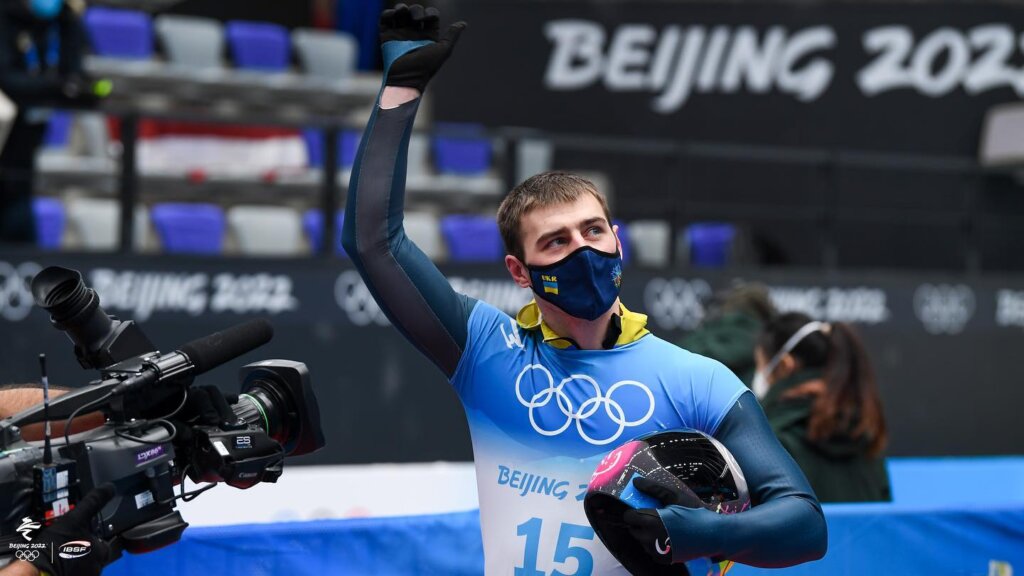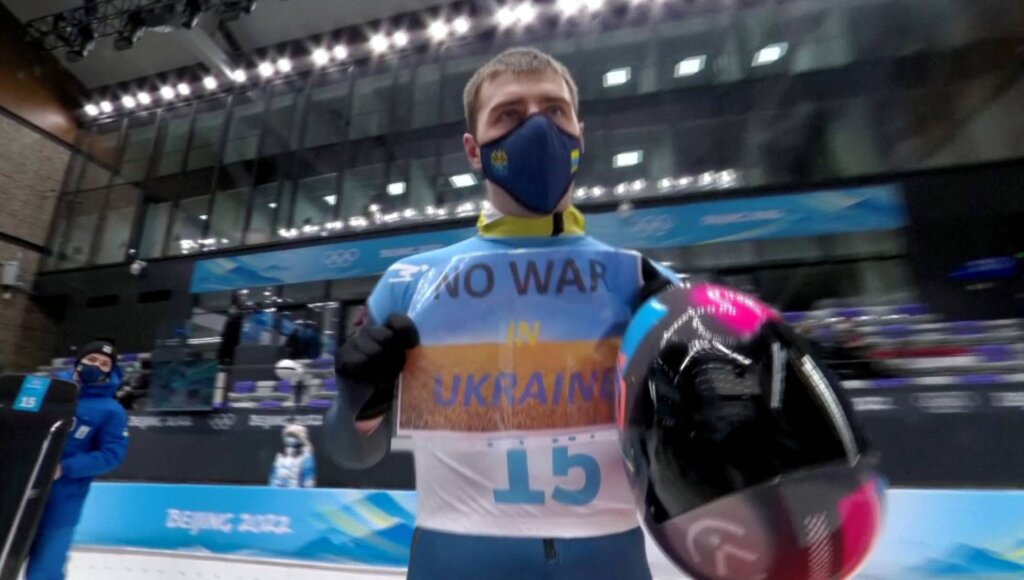Politics, protests, provocations and, of course, the pandemic, have required enormous sacrifices on behalf of Ukraine’s 45 Winter Olympians – and an act of protest by skeleton racer Vladyslav Heraskevych.
Sacrifice is nothing new for an Olympian.
Just look at all the Olympic-themed TV commercials outlining the sacrifices athletes have overcome just to compete at the Olympic Games.
The USA’s Michael Jordan was famously cut from his high school basketball team before becoming an Olympic champion. Canada’s Joanie Roachette won a memorable Olympic bronze just days after the passing of her mother.
For Ukrainian athletes competing at Beijing 2022, sacrifice is taking on an entirely different meaning.
With news of an imminent military invasion back home dominating the minds of every Ukrainian in Beijing – as well as a pandemic that has affected nearly 1 in 5 Ukrainian athletes at the Olympics – maintaining focus on high-level sport has become an Olympic-calibre event in its own right.
“The situation [in Ukraine] affects us because we all have family, we all have friends there”, monobob racer Lidiia Hunko told Reuters earlier this week.
“Of course, we treat people [including Russian athletes] as separate individuals, but it still leaves a mark.”
Protests & Provocations

In overcoming COVID and making a powerful anti-war statement, Heraskevych showed why Visa chose him as one of just 12 European athletes to sponsor.
Political topics have dominated press interactions with Ukrainian athletes in Beijing, with Russian reporters leading the charge.
Some athletes have had enough.
Ukraine’s first skeleton racer, Vladyslav Heraskevych, risked his sponsorships with Visa and Peak after racing with a “No War in Ukraine” sign that he flashed on TV screens post-race.
“It’s my position. I want peace in the world”, he told the Kyiv Post in an exclusive post-race interview. “And I want peace in my country. That’s all I can tell you.”
When asked by Russian reporters whether he was afraid of being sanctioned for a political protest, Heraskevych responsded:
“Honestly, I am very afraid of war. As any normal person, I do not want a war. This is my position.”
When questioned about his relationship with Russian athletes, Heraskevych doubled down.
“I respect them as athletes … But again, there’s something more important than our relationships – those are the lives of people who can suffer and who can die due to the war. So again – we are against war, we are only for peace.”

In this screen grab Heraskevych displays his anti-war message after travelling with the sign during his 3rd and 4th runs at the Yanqing National Sliding Center. (IOC/OBS/Handout via Reuters)
The Russian reporters showed no sense of irony questioning the Ukrainian athletes about sanctions while sporting on their backpack the Soviet hammer-and-sickle flag – a political symbol banned form these Olympics.
The IOC released a statement saying that Heraskevych would not be sanctioned, calling his action a “general call for peace”. The IOC has not yet commented on the appearance of Russian and Soviet flags and colours.
Heraskevych faced the latest line of political questioning Ukrainian athletes have faced since arriving in Beijing.
Figure skater Ivan Shmutarko took issue with how the Russian media had twisted his words.
“I really didn’t like the way you pulled out my words”, he told Russian publication Sport-Express.ru earlier in the week – the same publication that questioned Heraskevych.
“You wrote ‘Ukrainian speakers do not speak [Russian]. I did not say that … If you have questions about figure skating or me, I am open. If you need me to hype … [I’ll disengage].”
Besides provocative questioning, Russian reporters are increasingly being cited for bullying or outright provocations.
After the story had broken that teenage Russian figure skating phenom Kamila Valieva had tested positive for a banned substance, Russian media reportedly threatened to attack Western press members.
According to Britain’s The Guardian, one Russian journalist threatened his British counterpart by saying “You will be positive when you discover some new substances in your tea”, a reference to how Russian dissident Alexander Litvinenko and former Ukrainian President Victor Yushchenko were poisoned.
Another British journalist was surrounded by Russian press after asking Valieva about doping, with the threat “Our Russian journalists can tear you to pieces.”
Days before Valieva’s failed drug test was revealed, Ukrainian Sports Journalists’ Association President Alex Glyvynskyy was already questioning the intimidation tactics being used by Russia press.
“Should we now respond to Russian athletes with questions about doping and Russia’s military aggression”, he asked on social media.
COVID Crushes Ukraine’s Hopes
But politics and provocations are not the only thing on the minds of Ukrainian athletes.
With each passing day, the list of Ukrainian athletes that have been prevented from competing or training grows higher.
A day after Ukraine’s mixed aerials team – one of the country’s top medal hopes – was forced to withdraw mere hours before competing, Heraskevych revealed exclusively to the Kyiv Post that he also missed training due to a positive COVID test.
“I’ve also had this problem [with COVID], which I haven’t made public”, he told the Kyiv Post. “Because of that I missed my first training, so I had less rides than the other guys and yeah – it’s a big problem for me”.
The day before, Ukrainian press were already on their way to the Genting Sports Park in Zhangjiakou to cover the mixed aerials competition when word was received of the Ukrainian withdrawal.
Dmytro Kotovsky, Anastasia Novosad, and Oleksandr Okipnyuk became the fifth, sixth, and seventh Ukrainian athletes to test positive for COVID at Beijing 2022.
Heraskevych became the eighth – meaning nearly one in five of Ukraine’s 45 athletes at Beijing 2022 has missed competition or training because of a positive COVID test.
“Our whole team hurts”, Heraskevych told the Kyiv Post. “Our freestyle team didn’t compete. Our figure skating team did not compete. It’s not good for situation for us.”
[Note: Ukraine’s figure skating team did compete in the team event, but without a representative in the men’s programme due to Shmutarko’s positive test.]
Considering the tight restrictions the athletes are under, it is an incredible rate that requires closer scrutiny.
All athletes are vaccinated and live in the “closed loop”, which organisers insist is for the safety of participants. They are tested each day. Contacts with others are severely limited.
“In [mixed aerials], Ukrainian fans have hoped for medals – and rightly so – as during the season our athletes have shown consistently high results at prestigious international tournaments”, the Ukrainian National Olympic Committee told the Kyiv Post, referring to the team’s two bronze medals on the World Cup circuit this season.
“Unfortunately … the Ukrainian team does not have the opportunity to field a full team of three freestyle skiers to start the team competition”.
They added that the athletes are currently in isolation and being provided with appropriate medical care.
Overcoming the Odds
Overcoming the worry for loved ones back home, the political provocations of Russian reporters in Beijing, and dealing with the ever-present concern that a single COVID test could put to waste the last four years of training – the sacrifices and accomplishments of Ukrainian athletes must be lauded.
Ukraine may not yet have a medal, but two of its top medal hopes – the mixed relay biathlon team and the mixed aerials team – were forced to withdraw due to COVID.
Still, our athletes have provided moments to remember.
Kyiv’s Yuliia Dzhima has two Top 10 biathlon finishes to her credit, finishing 8th in the 7.5 km individual and 10th in the 15 km individual. Teammate Iryna Petrenko finished 11th in the 15 km race.
Their teammates have also seen success in the men’s biathlon events. Ternopil’s Dmytro Pidruchnyi finished 13th in the 10 km sprint, while Chernihiv’s Artem Pryma finished right behind him in 15th, showing why Ukraine’s men’s relay team may well be Ukraine’s best hope for a Beijing 2022 medal.
Ukraine’s biathletes are not the only ones winning applause.
Zakarpattia’s Ivan Kovbasnyuk put down one of the greatest performances ever by a Ukrainian alpine skier, finishing 14th in the alpine combined event. Only Mykola Skryabin has done him better by finishing 12th in the event at Nagano 1998.
But it was Heraskevych’s sacrifice – by both overcoming a positive COVID test just to compete and by risking sanctions and endorsements to make his anti-war statement – that were characteristic of the sacrifices Ukraine’s Olympians have had to make at Beijing 2022.
Now, there’s an idea for an Olympic-themed commercial about overcoming adversity that Visa could get behind.
